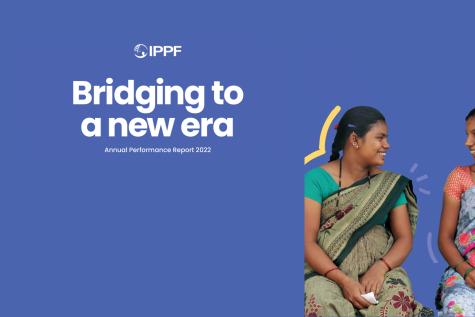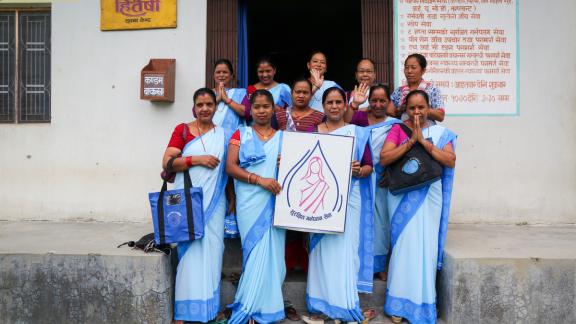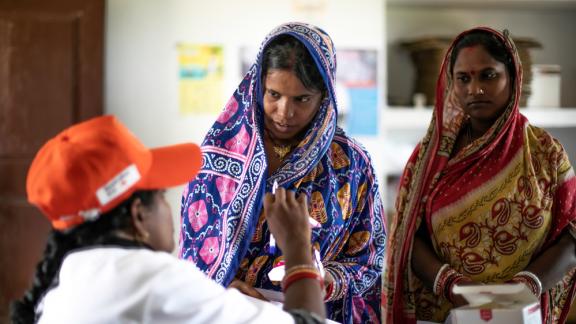Spotlight
A selection of resources from across the Federation

2022 Annual Performance Report
Bridging to a new era.
Filter our resources by:


| 01 November 2017
Accelerating Engagement of Champion
This report summarises highlights of the results achieved during the past three years, findings of the assessment of the project, lessons learnt, challenges faced and outline of what impact it leaves for future in terms of sustainability of these achievements. In responding to address the unmet need of family planning services in the region, IPPF SARO provided 22.8 million services in 2016. Nearly, 38 percent of these services were provided to young people. The project played an important role in demand generation through reaching to young people. Moreover, the values and learnings from the Champions Project were adopted globally in IPPF’s new strategic framework 2016-2022. This will allow IPPF to maintain the momentum, deepen further advocacy efforts through the champions and expanding engagement of support groups.

| 27 September 2017
IPPF's Response to Rohingya Crisis in Bangladesh
Since August 2017, nearly 436,000 new Rohingya refugees have reached Bangladesh which already hosts more than 700,000 Rohingya refugees, and this number continues to increase daily with new arrivals. Humanitarian needs are considerable and growing rapidly Looking at the current situation, IPPF has reached out to more than hundreds of young women, girls, boys and men by providing timely lifesaving sexual and reproductive health (SRH) services through medical camps. Support IPPF in this endeavor to provide critical services to Women and girls in Bangladesh

| 25 August 2017
SRHR Situation Analysis in South Asia.
This political mapping exercise seeks to conduct a situational analysis and understand the policy and programmatic environment pertaining to Sexual and Reproductive Health and Rights (SRHR) in nine countries of the International Planned Parenthood Federation’s (IPPF) South Asia region, namely Afghanistan, Bangladesh, Bhutan, India, Iran, Maldives, Nepal, Pakistan and Sri Lanka. It also aims to identify and prioritize issues of advocacy for SRHR in each of these countries as well as at the regional level and suggest strategies for advocacy on these issues with the government, non-government organizations, civil society organizations (CSO) and other relevant stakeholders.

| 05 June 2017
Financial Statements 2016
2016 saw the implementation of IPPFs new strategic plan and therefore was a year of transition for the Secretariat as operations were aligned to focus on the new outcomes. The strategy responds to social, political and demographic global trends. These include: the expectations and potential of the largest ever generation of young people; ongoing, significant social and economic inequalities, including discrimination against girls and women; and opposition that threatens gains in human rights. We continue to receive funding from and are grateful for the continued support of our key funders. With their support and help our unrestricted funding increased in the year to US$76.7 million from US$72.2 million. This was in spite of the United Kingdom’s decision to leave the European Union in June, which led to the weakening of sterling and Euro against the dollar and reduced our dollar income from our European donors. Restricted income increased from US$44.1 million to US$53.7 million. A significant factor in the increase was the US$10 million received from the David and Lucile Packard Foundation to enable IPPF to respond to the Zika crisis in the Western Hemisphere Region. The amount of grants to Member Associations (MAs) and partner organizations was US$68.3 million. Central expenditure decreased by US$2.9 million to US$16.1 million mainly due to the weakening of sterling whereas Regional expenditure remained consistent with the prior year at US$34.0 million (a US$0.4 million decrease on 2015).

| 17 February 2017
Mapping Study of Organisations & Networks in South Asia - Volume 2 Findings and Way Forward
This mapping study of networks, youth-led organisations, organisations that focus on youth development as well as youth-serving organizations has been conducted. A key aim of the study has been to bring these diverse organizations and networks on the same platform based on commonalities and also highlighting their strengths, so that through sharing of experiences, expertise and learning, SRHR with and for youth, including advocacy, can strengthen in the region

| 17 February 2017
Mapping Study of Organisations and Networks in South Asia: Volume 1, Map of Organisations & Networks
This document, a result of a mapping study undertaken in Nine countries in South Asia, showcases the dynamism of youth work and SRHR work in the region. It contains a purposive sample of 68 organisations/ networks working either on issues of SRHR, youth development and participation or both, with full recognition that the two are intrinsically linked. The data presented in the directory is information gathered either through primary data shared by the respective organisations/networks and/or supported by desk research. This is by no means an exhaustive list.









